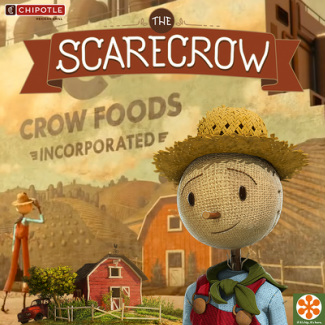 "The Scarecrow" explores the McDonaldization of society "The Scarecrow" explores the McDonaldization of society
Tags: capitalism, consumption/consumerism, corporations, environment, food/agriculture, marketing/brands, organizations/occupations/work, science/technology, theory, weber, farming, fordism, george ritzer, mcdonalidzation, rationalization, slow food, subtitles/CC, 00 to 05 mins
Year: 2013 Length: 3:23 Access: YouTube Summary: "The Scarecrow" is Chipotle's most recent commercial exploring the American dependency on highly rationalized farming techniques, which offend human conscience and wreak havoc on the environment (Note that Chipotle created a commercial with similar themes back in 2011). This animated short takes place in a dystopian universe where scarecrows punch in each day at a factory run by their crow overlords, and crow surveillance drones caw whenever production slows. The video is a useful illustration of what George Ritzer has called the McDonaldization of society, which refers to "the process by which the principles of the fast-food restaurant are coming to dominate more and more sectors of American society." Ritzer explains that McDonaldization is characterized by efficiency, calculability, predictability, and control. In and around the barren landscape owned by Crow Foods, one finds examples of efficiency everywhere. Conveyer belts efficiently move workers to their various stations in the factory, and livestock are stacked in crates, one on top of the other—an efficient use of factory space. Scanning the inner workings of the factory, it appears that ground beef, chicken, and pork are being squeezed through narrow chutes, and large blades worthy of a guillotine slice the meats into slabs with such precision that one could easily calculate and predict the amount of meat produced in any given hour. Controlling the pace of production is as easy as pulling a lever. While the video is quite literally Chipotle's straw man fantasy and is created with the aim of developing the Chipotle brand as a healthy, environmentally-friendly meal choice, the McDonaldization of food production is a very real phenomena and one sociologists take very seriously (The Sociological Cinema has also explored the issue here and here). What could be more important than understanding how a system, which was ostensibly developed to nourish vast numbers of people, is actually harmful to human health? Submitted By: Lester Andrist
3 Comments
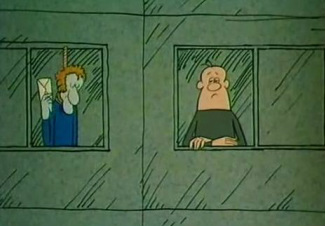 Gustav experiences modern life as an iron cage. Tags: rural/urban, theory, weber, gesellschaft, iron cage, rationalization, 00 to 05 mins Year: 1965 Length: 4:51 Access: YouTube Summary: This short cartoon comes from Hungarian animation. There are no words, but it skillfully and humorously illustrates the rationality and iron cage of modern life. It follows the main character, Gustav, from the end of his work day as a drone through his evening as he slowly descends into isolated madness. From a Weberian perspective, we might view the organization of modern urban life, with its highly efficient bureaucracies, traffic systems, and living spaces as overly rationalized spaces of social life. People are driven not by traditions, values, or emotions but rather by calculated efficiencies, and experience life in isolation from other humans. These systems of efficiency, calculation, and control constitute Weber's notion of an iron cage. It also works as an example of gesellschaft, where individuals act in their own interest (in contrast to gemeinschaft, where individual action is shaped via community norms and interaction). Ultimately, this existence drives Gustav to (unsuccessfully) attempt suicide and then to try to escape the monotony through alcohol and sleeping in the street, only to find he cannot escape the iron cage. Viewers can be encouraged to identify the elements of daily life that reflect the rationalization, iron cage, and gesellschaft. Submitted By: Sydney Hart 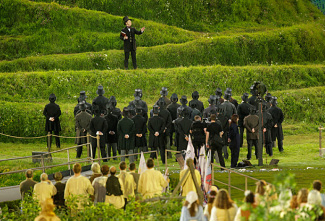 A scene from the 2012 Olympic Opening Ceremony. Tags: capitalism, class, durkheim, economic sociology, marx/marxism, organizations/occupations/work, theory, weber, alienation, disenchantment, mechanical and organic solidarity, species-being, 11 to 20 mins Year: 2012 Length: 20:00 Access: YouTube (start 13:40; end 33:40) Summary: The London 2012 Olympic Opening Ceremony focused in part on the Industrial Revolution which is seen to be pioneered by both the British and Europeans in the 19th Century. The ceremony opens with England depicted as a meadow, showing its agricultural past, then continues by depicting the industrial society that followed. This clip can be useful for illustrating many sociological concepts, such as Durkheim’s concepts of mechanical and organic solidarity; Weber’s concept of disenchantment; Marx’s concepts of a two class system, species-being, and alienation; and with the presence of the Suffragettes in the latter part, the clip can be used to introduce Feminist Perspectives. For example, Marx’s concept of species-being (the naturalness of human’s creativity and interaction with nature) is evident in the previous feudal/agricultural society, where the actors are seen enjoying nature and creative activities symbolic to the UK (such as cricket and Maypole dancing), interacting with family and friends, and partaking in ‘productive activity’ which they can relate to, e.g. farming and creative work. However, the people become alienated from their species-being through the era of industrialization. As capitalism developed, workers experienced alienation from their ‘productive activity’; alienation from the ‘product’; alienation from other workers; and alienation from their own creative ‘human potential’. This is shown in the video through the factory work occurring with greater numbers of workers, but with no contact among these workers with each other, working in unison like machines on products that they have no relation to and unable to express any form of human creativity. Viewers might also consider what is missing from the clip, such as colonialism, as well as the race and ethnicity of the actors (as compared to colonized subjects). Submitted By: Michelle MacDonagh 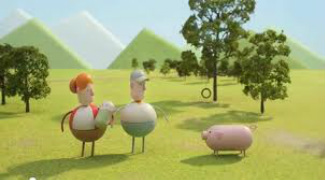 Tags: capitalism, commodification, consumption/consumerism, food/agriculture, economic sociology, marketing/brands, theory, weber, alienation, assembly line, farming, fordism, mass production, McDonalidzation, rationalization, simulacra, slow food, 00 to 05 mins Year: 2011 Length: 2:20 Access: YouTube Summary: Using Pixar-esque animation and Willie Nelson’s twang, this Chipotle commercial examines the development of our food production system. The commercial-story begins with images of pigs in an open pasture, which are then subjected to larger and more mechanized farming practices that lead to a highly industrialized food production system. It then shows a farmer (who evokes images of Middle America) as he slowly realizes the toxic effects, both on body and planet, of rationally commodifying agriculture and livestock. Set to Coldplay’s “The Scientist” (heartbreakingly sung by Willie Nelson), the main lyrics reference going “back to the start” and a return to earlier farming practices. Within the linear segment, we learn that the said farmer’s consciousness-raising leads to cage-free farming, thereby allowing him, his family, and their farm animals to lead a more socially conscious–and seemingly happy–existence. This clip can bring to life theories of consumption, aiding sociologists-in-training in conceptualizing concepts including Weber’s theories on rationalization, George Ritzer’s theories on McDonaldization, and Jean Baudrillard’s musings on simulacra. It can be useful to spark conversations on the social and environmental impacts of consumption behaviors and the potential impacts of industrial farming practices for human health. Finally, Chipotle’s commercial provides an opportunity to examine the complexities–and sometimes contradictions–of advertising. After a discussion on whether they are prompted (as educated consumers) to frequent Chipotle now that they’ve seen the commercial, the viewer might consider some little known facts and inconsistencies of the fast-food chain. For example, the McDonald’s Corporation was at one time a major investor in Chipotle, though now divested from the Mexican grill. In January 2011, the fast-food chain was in the Minnesota headlines when several locations were hiring undocumented workers, therefore coming to the attention of U.S. Immigration and Customs Enforcement (ICE). Once discovered, Chipotle fired the employees, ranging from 350 to 700 people. This begs the question, while ethical treatment is being maintained for farm animals, is ethical treatment being maintained for actual human employees? Submitted By: Beverly M. Pratt 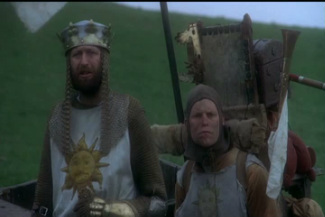 Dennis the peasant gets an impromptu visit from the King Dennis the peasant gets an impromptu visit from the King Tags: class, inequality, marx/marxism, political economy, theory, weber, charasmatic authority, class conflict, class consciousness, exploitation, ideology, labor, rational-legal authority, subtitles/CC, 00 to 05 mins Year: 1975 Length: 3:11 Access: YouTube Summary: This hilarious clip from Monty Python and the Holy Grail, illustrates several key concepts from Marx. After Dennis (a peasant) gets a presumptuous greeting from a visitor, he states "what I object to is you automatically treating me like an inferior." The visitor responds with "well, I am King." Dennis challenges him by arguing: "How'd you get that? By exploiting the workers. By hanging on to outdated imperialist dogma which perpetuates the economic and social differences in our society." Marx's concept of exploitation refers to the value that comes from workers' labor, but which gets taken by the ruling class (whether it be feudal lords, kings, or capitalists) because they own the means of production. The peasant describes this process as an unfair dimension of the class system. This awareness reflects his own class consciousness, or understanding of the class system, how it affects him, and how to act in his own class interest. Another peasant notes they are part of autonomous collective, which Dennis describes as their own self-rule based on equality. When they challenge the King's authority because they didn't vote for him, the king argues he obtains his authority from "the Lady of the Lake" that gave him Excalibur and right to rule by divine providence. Dennis comically responds that "Strange women lying in ponds distributing swords is not basis for government; supreme executive power derives from a mandate from the masses, not from some farcical aquatic ceremony." Their competing interests reflect the class struggle in which the workers' interest (self-rule that allows them collective ownership of the means of production) are inherently in conflict with those of the ruling class (who seek to control the workers and keep the value of their labor for themselves). Finally, the notion of divine right to rule is an example of ideology, or ideas supported by the ruling class, and which legitimate the current order and obscure the oppressive class system. I would like to thank Camilla Hayes and Andrew Hanko for recommending this clip. Submitted By: Paul Dean  Melissa Harris-Perry Melissa Harris-Perry Tags: abortion/reproduction, historical sociology, government/the state, politics/election/voting, theory, violence, weber, civil liberties, democracy, melissa harris-perry, social contract theory, states rights, thomas hobbes, 11 to 20 mins Year: 2012 Length: 20:55 Access: msnbc Summary: The social contract refers to the individual's acceptance of some social rules and limitations in exchange for the protections and benefits from the state. The concept was initially developed in the philosophies of Thomas Hobbes and Jean-Jacques Rousseau; however, sociologist Max Weber further specified the social contract as it relates to violence by highlighting how all forms of political organization including democracy, entrust "the state" (e.g. government at all levels) as the only social institution that can legitimately use physical force. In this video, political scientist and pundit Melissa Harris-Perry applies this Weberian approach by arguing that the State of Virginia failed to force women to undergo an invasive procedure, known as a transvaginal sonogram, prior to having an abortion because social consensus concluded it was not a legitimate use of force (or even violence) by the government. In other words, the state was in breach of the social contract. For a similar discussion on the same political issue, Rachel Maddow explores the fringe pro-life movement’s use of illegitimate violence against abortion doctors in her full-length documentary, The Assassination of Dr. Tiller. Submitted By: Jason Eastman 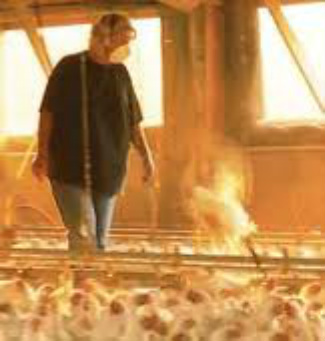 Carole Morrison explains modern chicken farming practices Tags: capitalism, food/agriculture, marx/marxism, organizations/occupations/work, theory, weber, alienation, assembly line, fordism, labor process, mass production, rationalization, subtitles/CC, 00 to 05 mins Year: 2008 Length: 4:47 Access: YouTube Summary: This clip is from Food Inc., a documentary illustrating how giant food corporations have taken control over the entire food production system "from seed to supermarket." The video shows how this rationalized system leads to the alienation and impoverishment of its workers, such as Carole Morrison (a Perdue chicken farmer). It illustrates all four dimensions of Marx's concept of alienation. First, Morrison is alienated from the production process because Perdue dictates how the chickens must be raised. Perdue requires that chicken farmers enter contracts with them, which require the farmers to upgrade their farms to dark, windowless facilities in order to raise the chickens faster and make them less resistant. Working for Perdue, Morrison is also alienated from her species-being because her creativity is being stifled, meaning she cannot raise the chicken in a natural environment. She may prefer allowing the chickens to see light or she may have a different method of ventilating the room than Perdue mandates. Perdue's practices also alienate Morrison from her product. When she's done raising the chickens, Perdue comes and takes them all away. Mrs. Morrison's labor only serves to benefit Perdue and she does not get to keep or benefit from the products she raises (i.e. produces). Finally, Morrison is alienated from her fellow workers. Even though there are many different farmers contracted by Perdue, they have no connection to each other and only care about following Perdue's commands. Morrison says that farmers are afraid to speak against Perdue because they might lose their contracts. If one farmer were to lose her contract with Perdue, it would be safe to say that the other farmers would either be indifferent or might not even know. This clip also illustrates Weber's notion of rationalization in that Perdue seeks to make the production of chickens increasingly efficient, calculable, predictable, and controllable (e.g. they make chicken coups dark because it makes the chickens more docile and easier to catch). However, there are many "irrationalities of rationality," including diseases, mistreatment of animals, and abuses against workers. Finally, the video notes that many workers that come to take the chickens are undocumented workers,and Perdue knows that they "aren't going to complain" about being subjected to diseases or unfair treatment. The worker's undocumented status makes them easier to control. Note that because of Morrison's participation in the documentary, her contract with Perdue was terminated. Submitted By: Reza Rahvarian and Alex Hong 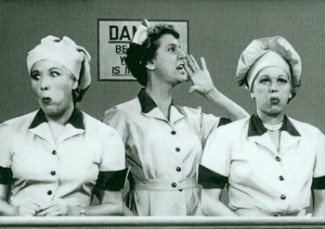 Lucy and her friend Ethel experience the iron cage Lucy and her friend Ethel experience the iron cage Tags: organizations/occupations/work, theory, weber, george ritzer, iron cage, irrationality of rationality, mcdonaldization, rationalization, subtitles/CC, 00 to 05 mins Year: 2010 Length: 1:45 Access: YouTube Summary: This is a clip from an episode of “I Love Lucy,” where Lucy and her friend Ethel are working in a candy factory and are tasked with wrapping bite-sized pieces of chocolate as they move along a conveyer belt. They begin fine, however, the belt speeds up and the candies start coming too quickly, leaving Lucy and Ethel desperate to keep up. Instructors can use this clip as a humorous way of beginning a discussion about Ritzer's turn of phrase, "the irrationality of rationality" (which is tied to Max Weber's notion of the "iron cage"). In his popular book, The McDonaldization of Society, Ritzer explains: "Most specifically, irrationality means that rational systems are unreasonable systems. By that I mean that they deny the basic humanity, the human reason, of the people who work within or are served by them." In the clip, the worker's need for the conveyer belt to move at a "human" pace is subordinate to the demands of a rationalized production process, which seeks to employ the smallest number of workers possible to wrap a lot of chocolates. Students can be encouraged to consider other examples, such as the way rationalized food preparation practices have resulted in less nutritious food. This irrational outcome from a rationalized food preparation system is contributing to large scale health problems. Submitted By: Elizabeth Majchrzak 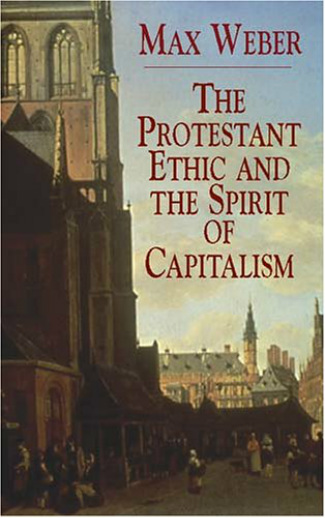 The Protestant Ethic and the Spirit of Capitalism Tags: weber, capitalism, theory, protestant ethic, religion, rationality, subtitles/CC, 06 to 10 mins Year: 2009 Length: 9:49 Access: YouTube Summary: This is a student-made video that summarizes Weber's book, The Protestant Ethic and the Spirit of Capitalism (which was done for a sociology class assignment). It uses music, subtitles, and still images. The video is very well done and covers all the main points from the book. Submitted By: Paul Dean 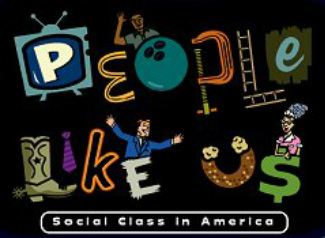
Tags: class, consumption/consumerism, inequality, theory, weber, cultural capital, status, stratification, subtitles/CC, 21 to 60 mins
Year: 2001 Length: 24:50 Access: No online access (limited clips available on YouTube; including Tammy's Story) Summary: According to the creators of this PBS documentary, "class can be harder to spot than racial or ethnic differences, yet in many ways it's the most important predictor of what kind of financial and educational opportunities someone will have in life." The video explores how "income, family background, education, attitudes, aspirations, and even appearance mark someone as a member of a particular social class" and how these differences divide American society. While this documentary conceptually muddles concepts of class and status, it is an excellent and very entertaining exploration of these topics. This selection includes 3 excerpts that provide an Introduction to social class (begin at 0:15; end at 9:30), and excerpts that juxtapose upper middle class groups (9:30-13:30; 35:25-40:45) and working class groups (Tammy's Story: 52:45-59:00). The full documentary is 124 minutes. It is an excellent starting point for defining class, discussing class inequalities, or identifying cultural differences across class. Submitted By: Paul Dean |
Tags
All
.
Got any videos?
Are you finding useful videos for your classes? Do you have good videos you use in your own classes? Please consider submitting your videos here and helping us build our database!
|
 RSS Feed
RSS Feed
